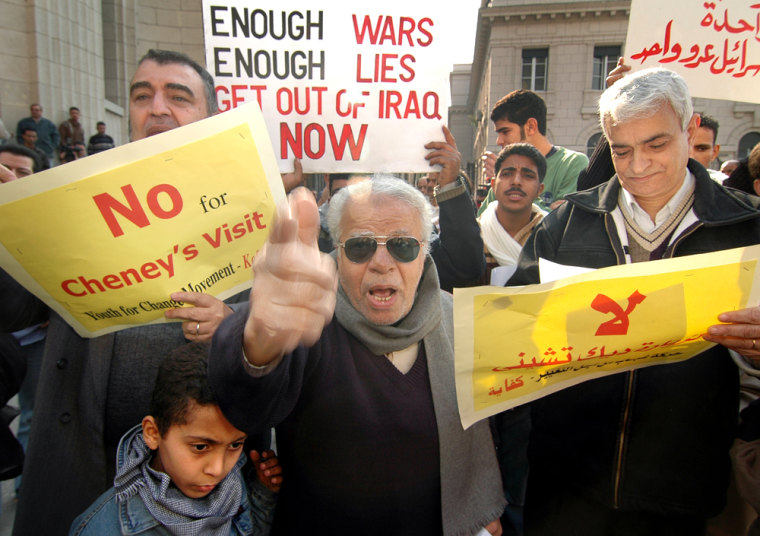CAIRO — Three years after the American-led invasion of Iraq, the views that most Arabs have of the United States does not provide a pretty picture.
The vast majority saw the U.S.-led invasion of Iraq as unjust and illegal from the start. This, added to the failure to find weapons of mass destruction and lack of proven links between al-Qaida and former Iraqi President Saddam Hussein — the original U.S. justifications for war — have only deepened their mistrust.
And for the minority who initially supported regime change in Iraq — and the premise of spreading democracy across the Arab World — their hopes have foundered on the failure to stabilize Iraq, a steady stream of human-rights abuses (both by foreign troops and the Iraqi security forces) and the lack of significant democratic reform in other Arab countries.
"America may have been well-intentioned but created many blunders, such as Abu Ghraib, and their failures and scandals to date have created frustration among the people," said Khaled Al -Maeena, Jeddah-based editor-in-chief of the Saudi Arabian English language Arab News newspaper.
Gamal Abdul Gawad, head of the International Relations Unit of the Al Ahram Center for Strategic and Political Studies in Cairo said that even people who had been optimistic about the potential of American success feel a sense of defeat.
"Those who at the beginning thought it was a good move to allow for ridding dictatorship and building democracy felt disillusioned by the American failure there,” he explained.
“People at the very beginning were ready to defend or justify it in favor of modifying democratizing the Arab World," Gawad added. "They thought about the American grand design to transform the Middle East, but now they realized it is not there.”
Blame clearly assigned
The blame for a string of failures in Iraq has fallen squarely on the shoulders of the U.S.
"The failure, the deaths, the terror, the inability of Iraqis to get anything done is blamed on Americans and the sectarian setup," said Mostafa Hamarneh, director of Jordan University's Center for Strategic Study. “The war was never popular, but had Iraq been a success things would have been different."
This has added to the widespread belief, often reinforced by editorials in popular publications, that the U.S. invaded Iraq primarily to control oil reserves and in addition set out to intentionally divide Iraq in order to achieve that goal.
"U.S. forces focused only on controlling oil resources,” read the headline on an editorial in the pan-Arab Sharq Al Awsat newspaper, which went on to opine that, “The U.S. is spreading the culture of division and sectarianism by allying with one sect against the other."
An opinion piece in the al-Jazeera Web site site took much the same view: "The Americans have proved incapable or unwilling to provide security…. After three years of occupation and innumerable experiences, American negligence is nothing short of conspiratorial."
Questions about commitment
Some now fear that the U.S. is incapable, and probably unwilling, to prevent a civil war in Iraq or bring it to an end.
An editorialist for the pan-Arab Sharq al Awsat newspaper purportedly quoted U.S. Secretary of Defense Donald Rumsfeld in a column to back up his paper's view that the Americans have no intention of getting involved in the resolution of an Iraqi civil war: “As Rumsfeld said, 'If civil war breaks out in Iraq, the Iraqis must deal with it.’"
Rallying point
Observers agree that Iraq has become a rallying point for Islamists — both militant and moderate.
Dr. Dia Rashwan, an Cairo-based expert on militant Islam, cites political victories by the Palestinian militant group Hamas and the Muslim Brotherhood in Egypt as evidence of a rise of what he calls socio-political Islam. Under this vicious-circle scenario, the occupation of Iraq and its aftermath have crystallized the feeling among Muslims worldwide that they are under siege and has led them to unite under the flag of Islam.
An editorial from Egypt's moderate Al Ahram weekly concurs with Rashwan’s view. "On one hand, the crimes and wars of the U.S. president drive young Muslim men to join the ranks of al-Qaida. On the other, the threats of Bin Laden provide a fig leaf for naked U.S. aggression."
That said, terror attacks in Jordan and Saudi Arabia caused a backlash against militants, drying up popular support and sympathy; however, anger at the U.S. was not softened.
"While attacks by Zarqawi's al-Qaida group reduced support for al-Qaida and others, it did not translate into support for the U.S.," said the Jordan University’s Center for Strategic Studies' Hamarneh.
Anger deepens the divide over other issues
The occupation of Iraq also has compounded Arab anger over other issues, particularly the unresolved Palestinian problem, leading to deeper divides, even among old friends.
For instance, U.S. allies in the Arabian Gulf felt betrayed when the U.S. Congress rose in opposition to the agreement with Dubai Ports World to control six U.S. ports. They construed it as further evidence of an anti-Muslim, anti-Arab bias by sectors within the U.S. government.
According to Al-Maeena, the Arab News editor, many Saudis, even those who have a basic admiration for America, are unofficially boycotting American goods when possible. "We like America, but we are being kicked around and we want friends, not masters," he said. "Dubai World Ports is the last nail in the coffin…. We have had enough. Even if governments stoop and bend down, Arab and Muslim people have had enough. We are sick."
In the Khalij Times, a United Arab Emirates English newspaper, an investment banker wrote that the defeat of the Dubai Ports World deal would "strip bare our illusion that an Arab, a Muslim, can ever be a friend of America again."
